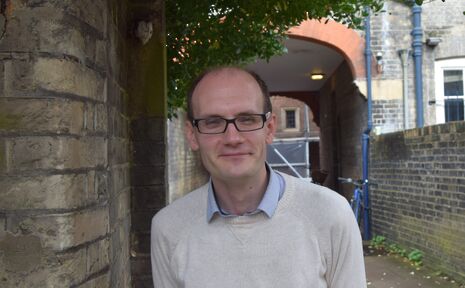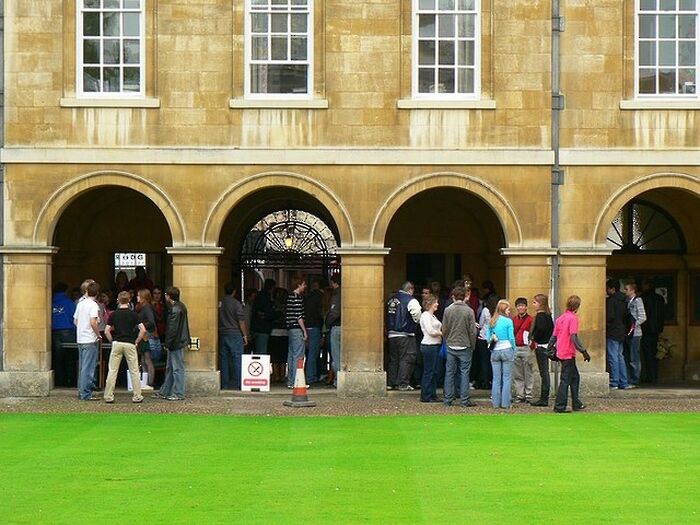Medwards’ admissions tutor: ‘For many it’s the first time they’ve failed something’
Murray Edwards’ admissions tutor, Andrew Spencer, speaks to Varsity about admissions, class and gender equality

Having spent four years as admissions tutor at Christ’s College before recently moving to Murray Edwards, Andrew Spencer has spent years deciding the fate of Cambridge applicants.
Judging applicants is no easy task. “You’re dealing with the top 1 or 2 % of ability range, so there are lots of very, very good candidates. The University gets 16,000 applications, we make 3,500 offers. I would say, off the top of my head, five or six thousand people out of those could come to Cambridge and do really well.”
It’s also a role which is surrounded by a lot of myths. “In any process where it’s hard and a little bit opaque there’s always going to be myths that develop around it, the mystique of how to do it.
This isn’t helped by the fact that it’s often something people really want. “For many people who apply to Cambridge and are unsuccessful it’s the first time in their life they’ve failed something, with the possible exception of their driving test.”
“So myths build up around that and that is perpetuated by commercial companies that prey on those insecurities that people have that this is the secret way of getting in.” At the end of the day though, “there is no secret formula” so the events these commercial companies hold are “essentially are a waste of money”. Clashing with the core aims of the colleges, Spencer argues they shouldn’t be allowed to use college premises, and “it’s something that can be eradicated with better coordination between admissions and conference offices.”
“If we feel that gender equality is something that we’ve solved we’re either startlingly naïve or horrifically complacent”
We talk about the difference between working at Christ’s, one of the oldest colleges, and Murray Edwards, one of the newest and also one of three all-female colleges. Ultimately, Murray Edwards is all about “trying to right a historic wrong. It has a mission in that for 90% of Cambridge’s existence, women were not allowed to take degrees; for 30 years after women had the vote, Cambridge decided that women weren’t capable of taking a Cambridge degree.”
“If we feel that gender equality is something that we’ve solved we’re either startlingly naïve or horrifically complacent.” Cambridge is behind the rest of the education sector when it comes to inequality as 48% of Cambridge students are women compared to a national average of 55%.
Even if the ratio was 50:50, Spencer questions whether that would be enough grounds to eliminate all-female colleges: “Murray Edwards is a small college, one of 25 undergraduate colleges but 10% of all female undergraduate scientists are at Murray Edwards, if Murray Edwards and Newnham were mixed the problem would get worse.”
For Murray Edwards, it’s not just about representation, it’s also about performance in Cambridge. If you look at all tripos parts across all subjects in 2017, “in only three parts of the Tripos did women outperform men in terms of getting Firsts.”
“In Maths, where there are many more men than women, and in English, where there are many more women than men, the differential between the number of men getting Firsts and the number of women getting Firsts in Part II was more than 20 percentage points.” Murray Edwards has a role in continually pushing that issue.
“Cambridge is very diverse in lots of ways, but it’s not terribly diverse in socio-economic terms.”
Spencer sees himself as a cog in such a struggle. “I think the great thing about Murray Edwards is that it has a mixed fellowship.
“That doesn’t mean that men are going to come in and explain it all. What it actually means is that men have to solve their own problem in this.
“Just by moving to Murray Edwards I am recognising my faults and that I am contributing to that problem. I need to change to help solve this problem.”
This isn’t just personal experience; a survey of Murray Edwards alumnae found that the greatest barrier for women in their careers was masculine workplace culture. Since we spoke, Murray Edwards has expanded its mission, changing its policy and allowing transgender students to apply. In the words of President Barbara Stocking, it is “absolutely right, both legally and within our set of values, for anyone who
identifies as female to be able to apply to study with us”.
While encouraged by the steady increase in state-educated students at the University since the 1980s, Spencer notes that “Cambridge is very diverse in lots of ways, but it’s not terribly diverse in socio-economic terms.”
“One of the things that reassures me that we’re making decent decisions is that unlike in the university sector as a whole, where you can say that if a state school student and a private school student has the same results at A-level, then the state school student will do better at university than the private schools student, that’s not the case at Cambridge.”
“There is a broad level of achievement between independent schools and state schools and also the breakdown in state schools, as grammar school students don’t do significantly better or significantly worse than comprehensives or sixth form colleges or FE colleges.”
Spencer sees myths about Cambridge in the media as unhelpful. “My job as an admissions tutor and the job of my colleagues as fellows and staff is to make anyone who has got the potential to do well at Cambridge feel that Cambridge is a place for them.
“I think that that’s something we all need to still do more work on.”
 News / Eight Cambridge researchers awarded €17m in ERC research grants27 December 2025
News / Eight Cambridge researchers awarded €17m in ERC research grants27 December 2025 News / Clare Hall spent over £500k opposing busway 24 December 2025
News / Clare Hall spent over £500k opposing busway 24 December 2025 Comment / League tables do more harm than good26 December 2025
Comment / League tables do more harm than good26 December 2025 Comment / The ‘class’ of Cambridge24 December 2025
Comment / The ‘class’ of Cambridge24 December 2025 News / Caius mourns its tree-mendous loss23 December 2025
News / Caius mourns its tree-mendous loss23 December 2025









